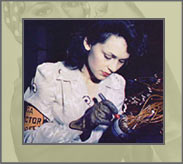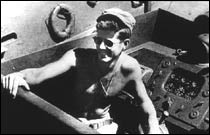| |
Going
to Work

This
woman, working on an airplane in California, was one of many women
who worked as riveters in a war industry plant, just like Betty's
aunt. Photo Credit: Library of Congress. |
After graduation,
my friends did various things. Some girls became secretaries in
regular offices, and some got married. One friend, I remember, took
a five-day train trip to California to marry her boyfriend before
he was shipped overseas.
That summer,
I went to work at the PT boat factory in Bayonne, New Jersey. By
then, my aunt was no longer at home gardening but had become a riveter
at the factory, and she helped me get a job. I was not a riveter
— I did not do the physical work of building the boats — I worked
in the office.
My day started
early; around 6:30 my mom would drive me to the bus stop. She would
continue on to her job as a chief clerk on a pier in Staten Island.
I would take the bus to Bayonne, New Jersey. We would punch in at
9 a.m., and sit in the large office. There were many other people
working, each at their own desk. Most of the day, I spent typing
specifications.
I typed these documents for the chief of the office, who would use
them to make sure each PT boat was the best it could be.
I made about
$30 a week, which was pretty good for that time. My aunt made even
more money because her job as a riveter was very physical and because
she worked in shifts — sometimes in the day, other times at
night. My family was happy I had a job. I could now buy my own clothes,
and my mom could save more money.

During
World War II, future President John F. Kennedy commanded a PT boat.
Credit: John Fitzgerald Kennedy Library |
For me, the
most interesting part of working was being able to walk through
the plant and see all the boats in various stages of completion.
PT boats were built upside down, and when they were completed, they
were turned over by electric motors — machines which would
flip the boat over at the push of a button — and given a number
instead of a name. Pushing this button was an honor.
Because she
was a riveter who worked on the boat, my aunt was lucky enough to
be given the honor of turning over PT boat 511.
Think About
It
Why was it important that women join the workforce during the war?
How do you think it made them feel to be part of the bigger war
effort?

|
|

